
San Luis Obispo County, officially the County of San Luis Obispo, is a county on the Central Coast of California. As of the 2020 census, the population was 282,424. The county seat is San Luis Obispo.
Sycamore Mineral Springs Resort is a resort located in San Luis Obispo County, California. It is located near Avila Beach. This resort is mostly known for its mineral springs as it rests atop a natural hot mineral spring. The property spans 116 acres (47 ha) and offers guests a variety of activities. The resort was originally known as San Luis Hot Sulphur Springs.

Gilman Hot Springs, also known as San Jacinto Hot Springs or the Relief Springs, is a hot spring system in the Inland Empire area of Southern California. Located near Potrero Creek, the San Jacinto River, and California State Route 79, the springs system consists of "about half a dozen" springs named for the Mexican land grant Rancho San Jacinto Viejo.

Seminole Hot Springs is an unincorporated community in Los Angeles County, California, United States. Seminole Hot Springs is located in the Santa Monica Mountains near Cornell, 3.6 miles (5.8 km) south-southeast of Agoura Hills at an elevation of 932 feet (284 m).

Bimini Baths was a geothermal mineral water public bathhouse and plunge in what is now Koreatown, Los Angeles, California, US. It was situated just west of downtown, near Third Street and Vermont Avenue. Bimini Baths contained a natatorium, swimming pools, swimming plunge, Turkish baths, a medical treatment department, and bottling works.

Dirty Socks Hot Spring is a formerly developed hot spring near Death Valley, Inyo County, California, in the United States. A sulfur spring, the naturally occurring unpleasant odor may have been compared to smelly socks. The water is also often discolored with algae growth. Another explanation is that the spring was named from the fact miners washed their dirty socks there. The name may also be rendered as Dirty Sock, singular.

Wheeler Springs is an unincorporated community that grew around a set of sulphurated hot springs in Ventura County, California. It is located 6 miles north of the Ojai Valley, within Los Padres National Forest. It is named for Wheeler Blumberg, who founded the town in 1891, and the many natural hot springs.

Tuscan Springs are a group of springs in the U.S. state of California. Tuscan Springs was named for the fact its borax-impregnated waters were chemically similar to the springs of Tuscany, in Italy.
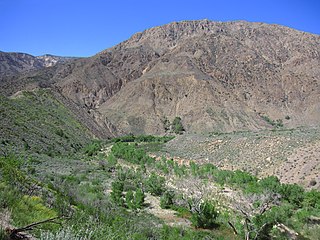
Sespe Hot Springs are a system of thermal springs and seeps that form a hot spring creek in the mountains near the Sespe Condor Sanctuary near Ojai, California.
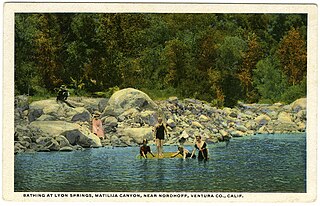
Lyons Springs, sometimes Lyon Spring, originally Nogales Hot Springs, was a naturally occurring sulphur spring and associated resort in Matilija Creek Canyon, near Ojai, Ventura County, California. Located between Vickers Springs and Matilija Hot Springs, the Lyon Spring resort was established in the 1880s.

Encino Hot Springs are historic thermal springs located at the site of Siutcanga village, a settlement of the Tongva-Kizh people of the area now known as Southern California. It was used by several tribes of Indigenous peoples for thousands of years. Later, after settlement, the artesian springs were used as a water source for Rancho Los Encinos in what is now the San Fernando Valley region of Los Angeles County, California. In the 1880s it was a rest stop on the Butterfield Stagecoach route. The springs are located in the modern-day Los Encinos State Historic Park.

Eden Hot Springs was a historic hot springs and resort in Riverside County, California, United States.

Urbita Hot Springs was a historic hot springs and amusement park in San Bernardino County, California, United States. Urbita Springs Park was located between E Street and Colton Street in San Bernardino where the Inland Center mall stands today.
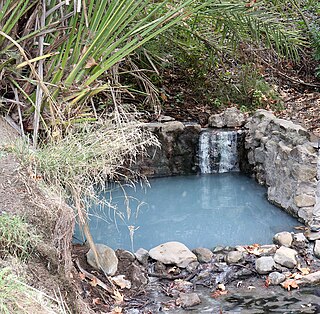
Gaviota Hot Springs is a geothermal feature in Santa Barbara County, California, United States. The two pools are accessible from the Gaviota Peak trail in Gaviota State Park. Gaviota Hot Springs is sometimes called Las Cruces Hot Springs or Sulphur Springs. The hot springs lie within the Hot Springs Creek watershed, near the junction of U.S. Route 101 and California State Route 1.
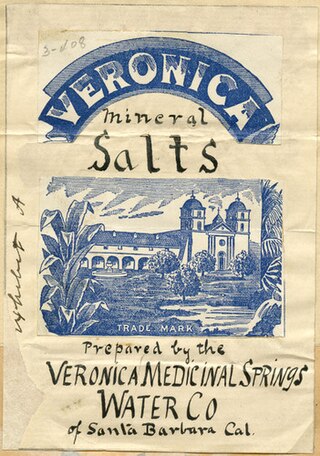
Veronica Springs, also Veronica Medicinal Springs, was a cluster of natural springs along Arroyo Burro creek in Santa Barbara County, California, United States. Veronica spring water was not a therapeutic spa water or a table water but a medicinal mineral water with high magnesium levels. The waters had a yellowish tinge and a strongly purgative-laxative effect, and beginning around 1887, the water was bottled and sold as a health tonic. Veronica Water peaked as a brand in the 1910s. The springs were capped off in 1962.

Alvarado Hot Springs was a 20th-century geothermal well in Los Angeles County, California, United States. A bathhouse was built next to the water and a therapeutic spa was operated on the site for several decades.

Delonegha Hot Springs are located in Kern County, California, United States, northeast of the city of Bakersfield and southeast of Glennville. Delonegha is one of several hot springs adjacent to the Kern River and State Route 178. The springs lie within the boundaries of Sequoia National Forest, "100 yd (91 m) down a steep dirt trail" from the highway. Except for a brief period in the first years of the 20th century when there was a small resort at the site, the Delonegha springs have remained largely undeveloped.
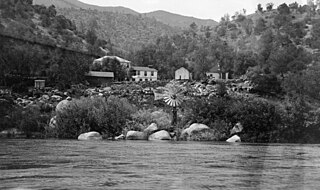
Democrat Hot Springs, named for the Democratic political party, is a geothermally heated spring located 17 miles (27 km) northeast of Bakersfield, California, United States, on the south bank of the Kern River and on the north side of California State Route 178.

La Vida Hot Springs were a historically significant natural spring and nearby hot-water well in Carbon Canyon, Chino Hills, Orange County, California, United States.




















